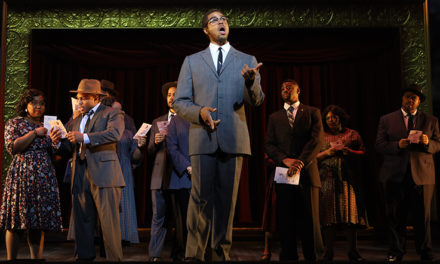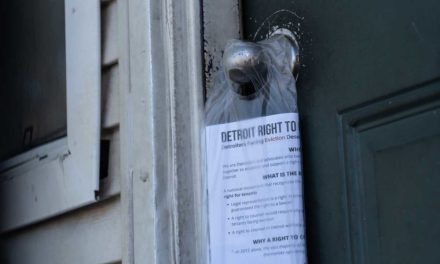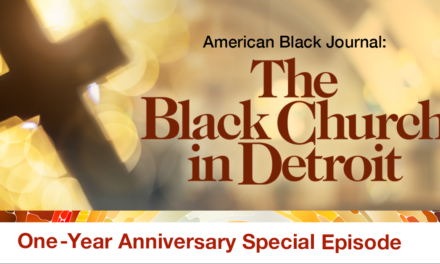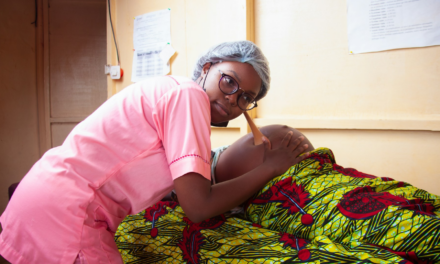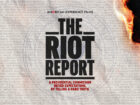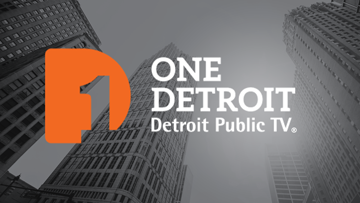A report from One Detroit’s Will Glover on the importance of diversity in the nation’s newsrooms. Plus, Stephen Henderson speaks with Michael McCarter, a managing editor at the USA Today network, about the role of diversity, standards and ethics in the media.
This segment is a part of American Black Journal and BridgeDetroit’s collaboration presenting a series of reports on issues threatening the lives of people of color and the groups advocating to protect them.
Read full transcript
Will Glover Historically, black Americans are underrepresented in decision making positions in one of the country’s most important institutions. The news media. But why does it remain this way? Is it denial in unawareness of the status quo? Here’s Vincent McCraw, president of the Detroit branch of the National Association of Black Journalists.
Vincent McCraw Unfortunately, over the years, I think it’s a little of both. I think newsrooms have been in denial for a long time.
Vincent McCraw And now when we see the culmination of these events just this year with the pandemic, the protest at the protest and some violence related to racial justice issues around the country and even this election, now, it’s even more important that the voices of journalists, black journalists in particular, and people of color be in these newsrooms, not only just in in in reporting positions, but in the news making, decision making positions, (objective observation is a cornerstone of journalism.)
Will Glover If newsroom directors don’t understand or acknowledge that if all observers are the same and does what they consider to be objective is the same, then this can lead to incomplete stories or coverage that may miss the point entirely.
Vincent McCraw Many are starting to understand. Many do understand and have understood for a long time, but then they lose their way. What they all should be looking for an understanding is that we as black journalists and journalists of color, the life experiences, the lived experiences that they bring to to a newsroom, the way they see a community, the way they cover a community, that doesn’t mean that there’s that. And that’s not to suggest that they’ll cover it any different than any journalists would cover a community. But when you bring your lived experiences to the job, then you have you know, there’s a there’s a different eye. There is a different, you see something that a white journalist is not going to see.
Will Glover That difference in life experience can be seen in moments like when CNN reporter Omar Jimenez is arrested live on air. The anchor doesn’t address the fact that the police arrest people with little to no explanation regularly and observed truth in the black community.
We don’t know why they’re being arrested. They’re not being given any explanation as far as we can here for why they’re being arrested.
We don’t know why they’re being handcuffed or when senior writer for The Root, Michael Harriot, was arrested. They’re asking is he’s media
Michael Harriot (he says he is.) I wasn’t the only one who didn’t have visible credentials. I was the only one who was filming. The only thing that distinguished me from the other people in that area was that I was black.
Vincent McCraw And the reason that Michael and the other weren’t surprised is because it’s a part of their lived experience, either in their own private lives. It may not have been them who has been arrested or or harassed by police, but someone close to them, some relative. And frankly, many of us particularly many of us black men have been pulled over by the police for something.
Stephen Henderson A new survey from the Knight Foundation and Gallup shows 79 percent of Americans feel news organizations should increase diversity among their staffs to better reflect the makeup of the U.S. population.
Stephen Henderson I spoke with Michael McCarter, managing editor at the USA Today Network, about the role of diversity, standards and ethics in the media.
Stephen Henderson So this is a pretty challenging time to be a black journalist in America. Not that there’s an unchallenging time of being just in America, but this is a particularly challenging time.
Stephen Henderson But it’s also a challenging time for newsrooms and the people who inhabit newsrooms, whether they be black or white, to make decisions about how to cover African-Americans. African-American issues, things like police brutality and systemic racism. I want to start with just your reaction to the way that American media is handling this moment.
Michael McCarter Well, I don’t want to paint anything with a broad brush, but I will say because everybody is handling things in their own way, just depending on what corner of the country you’re in. I will say that I am actually rather impressed that it has received the intense attention that it has because there have been times previously where any issue like this would get tamped down simply because they got zero coverage or very minimal coverage. Now, could I say that everything has been handled fairly? No, absolutely not. There are some markets where it’s sometimes you can see bias seek to seep into some of the coverage. But overall, I am impressed, especially because it’s been, you know, 90 days more more than 90 days. And the coverage is still there. It hasn’t gone away. The flavor, the onslaught. It hasn’t been one of those flavor of the week. And, you know, they’ve moved on to the next thing.
Stephen Henderson You and I have worked in newsrooms a long time. So we know how things work and our decisions get made. But to give our viewers a sense of the way in which these issues get discussed and sort of debated in newsrooms, as you’re thinking about coverage and how prominent black voices are in those in those discussions and those decisions.
Michael McCarter Well, again, it depends on what newsroom you’re in and what company you work for and what part of the country you’re in. Because if you have if you are fortunate enough to have a newsroom that has diversity and there the people there’s not just diversity in the room, but you have diversity in leadership ranks and decision making ranks. You can have more thoughtful conversations about how to approach the storytelling of of these issues of today. And you can also have very thoughtful and considerate conversations about once once the reporters come back about how these stories are going to be presented. It’s it’s very important that these things be we thought through and conversations be had. And you and you have to have a diverse newsroom otherwise you run into situations where if if you have people in the room that don’t have the empathy, don’t understand, have never been in some of the situations, don’t understand what the big deal is. Then the way they frame the stories takes a whole different toll.
Stephen Henderson I also think that there is a particular challenge here that doesn’t get talked about a lot. And that’s the challenge to white reporters who don’t share the experiences, obviously, that African-American reporters might have. But the need for them to be able to to learn and and try to gain some of the understanding and knowledge about about the African-American experience that will help them cover these issues a little better. I’m not sure that I feel like in most newsrooms that imperative reaches the highest levels of decision making. I feel like it’s a kind of lack of awareness of the need to have not just black report more black reporters in the room, but also to change the way that white reporters and editors deal with these things.
Michael McCarter I don’t disagree with you. I mean, I think there’s some that would argue that’s one of the challenges that we’re facing right now in policing, is that if if it’s hard to look in the rearview mirror and fix anything. But if you know that your reporters have not traditionally gone to certain neighborhoods, have not traditionally asked to to interview people of color, have not traditionally tried to do uplifting stories in certain communities. Then when, then when it all hits the fan, you don’t have a in. It is much harder for people to trust you. It becomes something that you can’t really fix overnight in the heat of the moment. What I work hard to do is to make sure that not only do we have, you know, reporters of color in the room who can offer some some insight and do have an experience that they can share with the room, but that we get our non, our reporters that aren’t traditionally in those neighborhoods out more often and get them, I won’t say trained, but get them familiar with the neighborhoods that they don’t normally visit. You know, I won’t say I won’t go so far as to say that you have to have black people covering black issues because, you know, that just wouldn’t be fair. I’m not saying that a white journalists cannot cover black issues well if they worked at it. But I would not sit here and say that I could cover women’s issues fairly and accurately, because I don’t have that life experience and it’s important that that’s in the room and that those opportunities remain. I would hate for any news organization to just hire people of color so when things go bad or things go sideways or they want reporting out of a different community, they can just send the black reporter. That’s, to me that’s not really helping the issue. That’s that’s a very poorly attached Band-Aid.
Stephen Henderson And it’s I think it’s also apparent that this is work that has to go on all the time. You know, the explosion of interest nationally in the BLM movement is a moment and that’s important. But to be prepared for that moment, you have to have been doing the work before. And I think that’s how newsrooms and reporters get caught flat footed, is that we don’t spend the time when there isn’t a crisis or when there isn’t a huge news headline getting people to understand that these issues matter and that you can’t just jump into them and really understand what’s going on. We’ve got to be, we’ve got to be working all the time to improve.
Michael McCarter Absolutely. I mean, there’s a proverb I use a lot that says, you know, the time to fix the roof is when the sun is shining. We have to be in the neighborhoods when everything is OK and everything is fine. We have to have conversations with people just over normal topics, normal issues. So then when things do escalate or there are issues that are more challenging, the the the effort to get into the neighborhoods and have people trust and talk to you is not nearly as hard.

